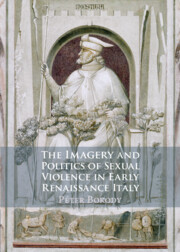Book contents
- The Imagery and Politics of Sexual Violence in Early Renaissance Italy
- The Imagery and Politics of Sexual Violence in Early Renaissance Italy
- Copyright page
- Contents
- Acknowledgments
- One Introduction
- Two Victims of Lust
- Three Medicalized Misogyny
- Four Rape As a Weapon of War
- Five Political Allegories
- Six Abduction in Illustrated Romances
- Seven Lucretia and the Renaissance of Rape
- Eight Conclusion
- Bibliography
- Index
Four - Rape As a Weapon of War
Published online by Cambridge University Press: 13 January 2023
- The Imagery and Politics of Sexual Violence in Early Renaissance Italy
- The Imagery and Politics of Sexual Violence in Early Renaissance Italy
- Copyright page
- Contents
- Acknowledgments
- One Introduction
- Two Victims of Lust
- Three Medicalized Misogyny
- Four Rape As a Weapon of War
- Five Political Allegories
- Six Abduction in Illustrated Romances
- Seven Lucretia and the Renaissance of Rape
- Eight Conclusion
- Bibliography
- Index
Summary
Giovanni Villani, in his chronicle, reports that, in 1117, Pisa and Florence formed a military alliance. Pisa asked for protection against Lucca, while their troops were busy in Mallorca besieging a Saracen stronghold (Figure 4.1).1 The safeguard from Lucca meant a Florentine military presence right at the doorstep of their neighbors, the problematic nature of which did not escape the attention of the author. Villani explains at length the measures taken by the Florentine army to avoid any potential attack on women in Pisa while their men were away.
[They] encamped two miles outside the city, and in respect for their women they would not enter Pisa and made a proclamation that whosoever should enter the city should answer for it with his person; and the one who did enter was accordingly condemned to be hung. And when the old men who had been left in Pisa prayed the Florentines for love of them to pardon him, they would not. But the Pisans still opposed and begged that at least they would not put him to death in their territory; whereupon the Florentine army secretly purchased a field from a peasant in the name of the commonwealth of Florence, and thereon they raised the gallows and did the execution to maintain their decree.2
- Type
- Chapter
- Information
- Publisher: Cambridge University PressPrint publication year: 2023



